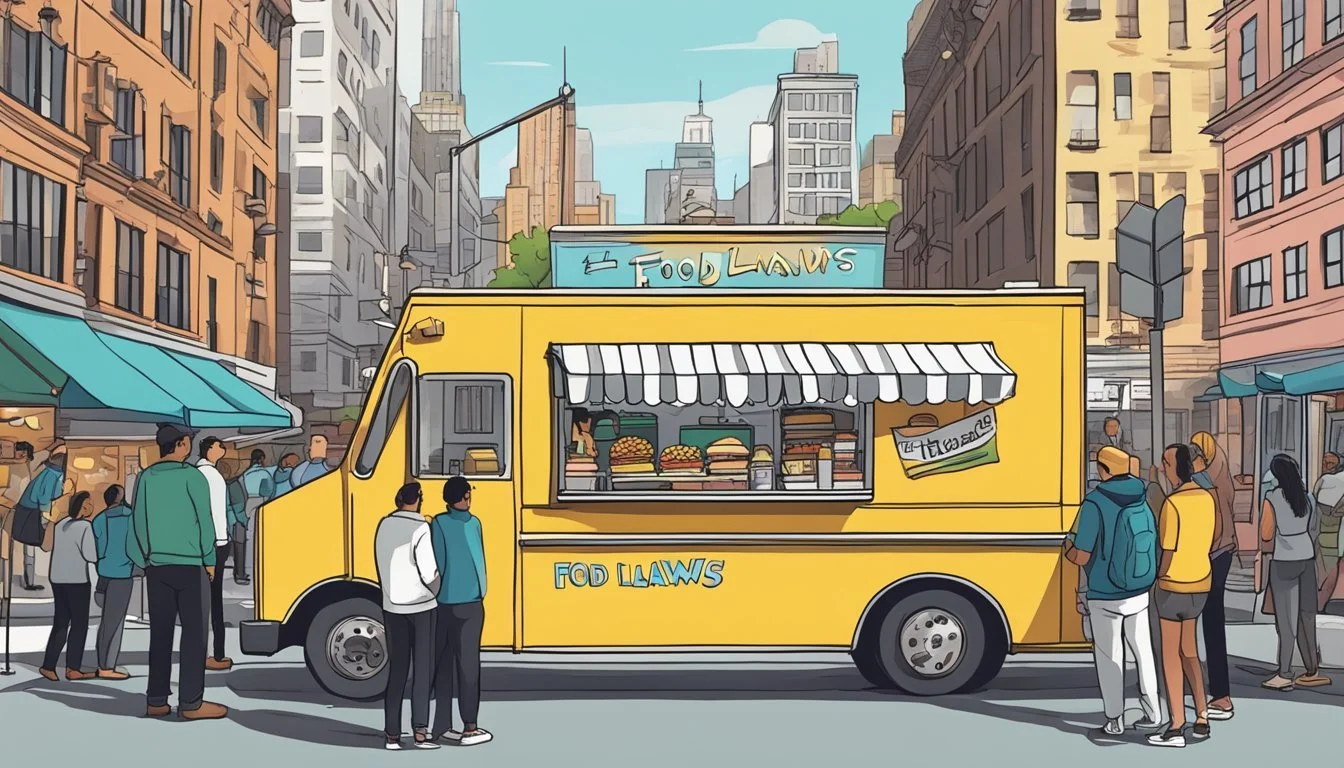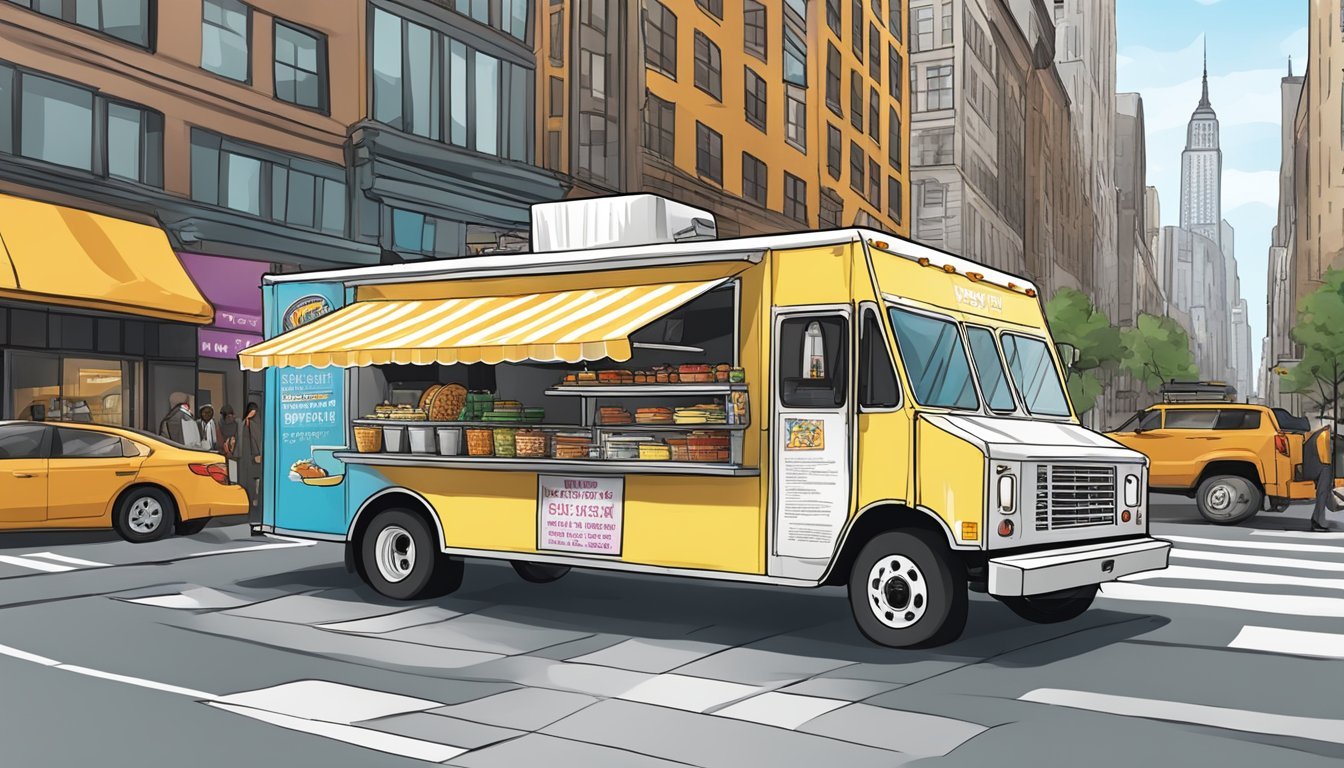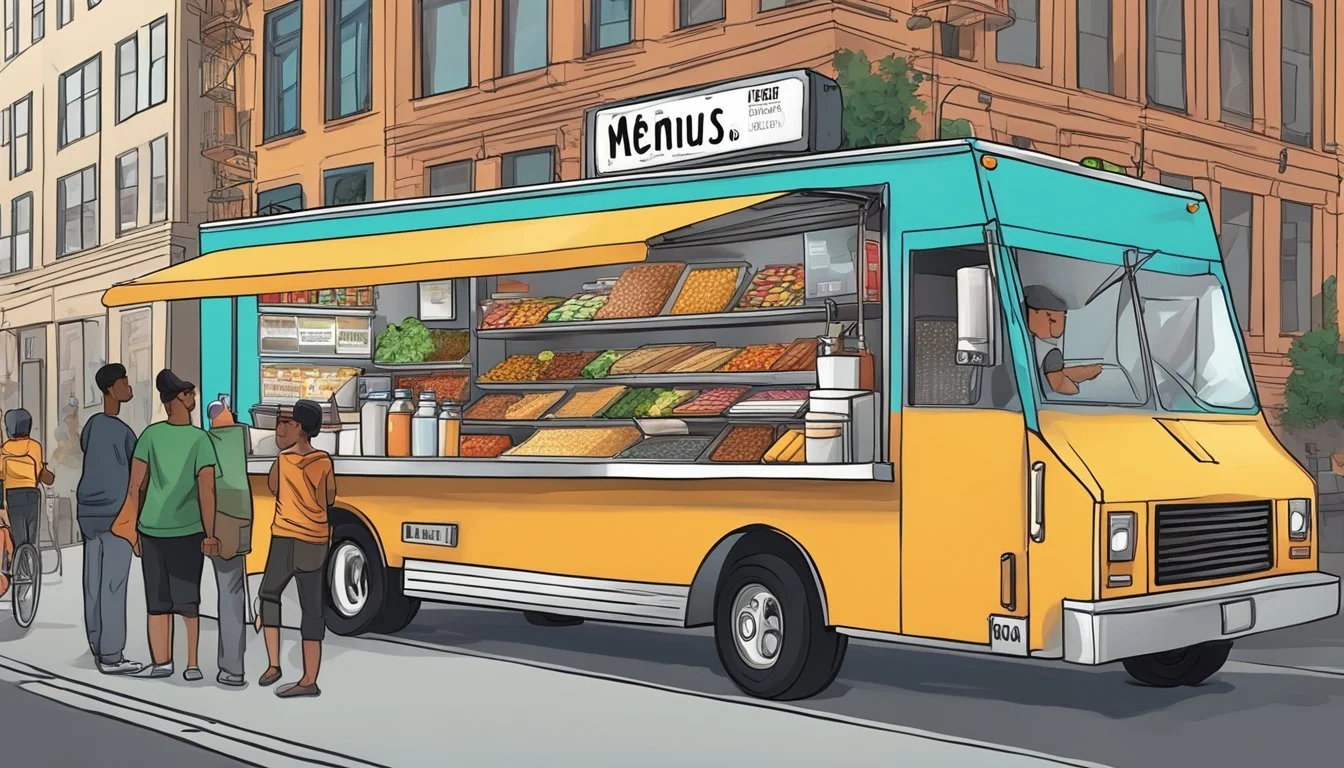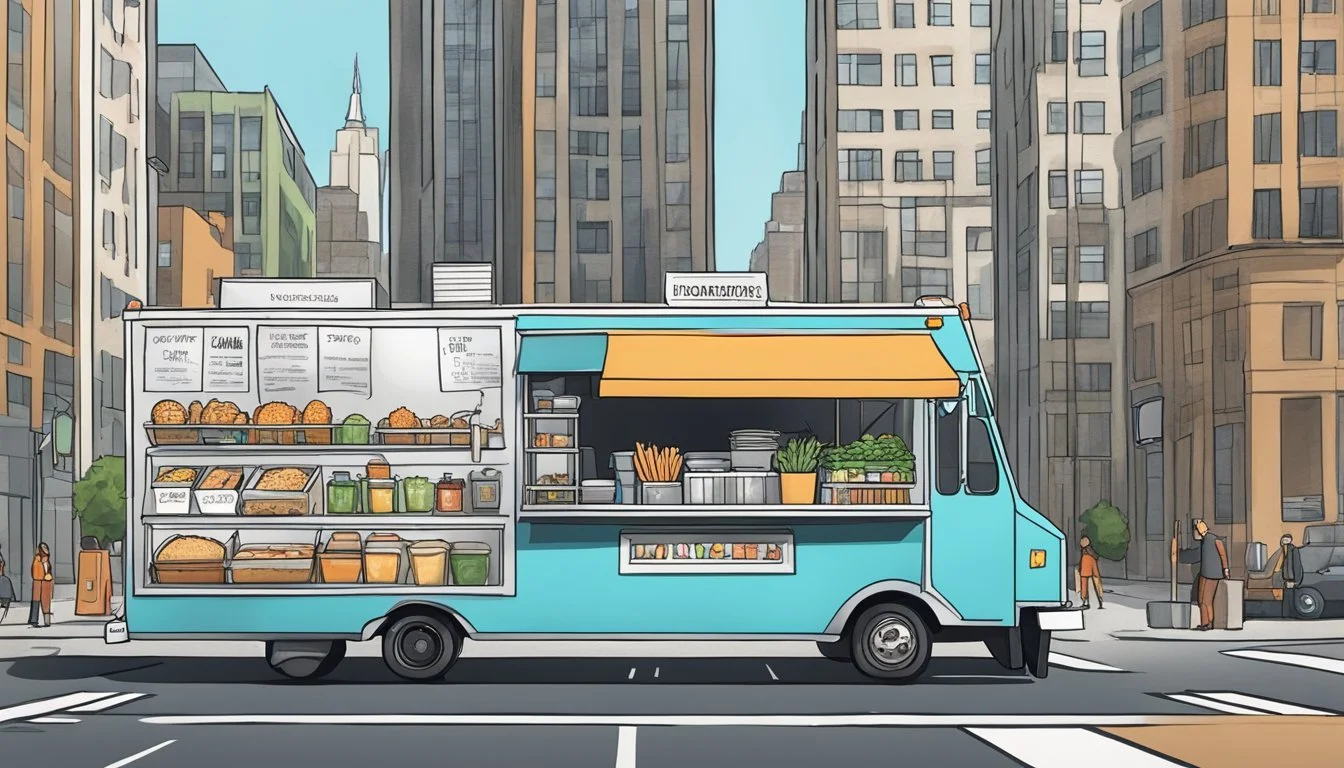Food Truck Laws in New York
Essential Regulations for Vendors
Operating a food truck in New York requires navigating a series of stringent laws and regulations that aim to ensure public safety, hygiene, and fair business practices. Both New York State and New York City have their own specific sets of rules that food truck operators must follow. In New York City, for example, vendors are required to obtain a mobile food vending license and a new type of supervisory license to maintain year-round operation. Additionally, as of a recently passed local law, there are a set number of new supervisory license applications accepted each year, affecting how new food truck businesses can enter the market.
Throughout the state, food truck operators must comply with food safety and handling standards, which include temperature control for food, proper waste disposal methods, and adherence to the health department inspections. These inspections occur at least once a year and are crucial for permit renewals and in response to any reported violations. Beyond the food-specific regulations, food truck owners in New York also need to pay attention to parking regulations and various local ordinances that might affect where and when they can operate.
New York State's Department of Health also imposes additional permit requirements for those preparing and selling foods outside of a Home Processor exemption. A food service establishment permit is essential unless the vendor qualifies for exemptions. These permits are indicative of New York's commitment to maintaining high standards in the food service industry, particularly where mobile food vendors are concerned. Compliance with these laws ensures that food truck businesses can provide services without interruptions and protects both the operators and the public.
Getting Started with Food Trucks in NY
Starting a food truck in New York involves understanding specific regulations, choosing the right type of truck for your culinary concept, and meticulously planning your business strategy. Entrepreneurs need to navigate through a series of mandatory steps to comply with local laws and set up a sustainable operation.
Understanding Food Truck Requirements
In New York, food trucks are subject to various licenses and permits that must be acquired before commencing operations. These include a Mobile Food Vendor License, a Food Service Establishment permit, and compliance with food safety ordinances. Prospective food truck owners should familiarize themselves with the detailed requirements laid out by the New York State Department of Health and local health departments.
Selecting Your Food Truck Type
Choosing your food truck type is a critical decision that will impact your startup costs and operations. Food trucks can range from converted vans to trailers or full-sized trucks. Each comes with different space and equipment capabilities. Consider whether you will prefer a new, custom-fitted vehicle or a used one that may require modifications to meet the food safety regulations in New York.
Drafting Your Business Plan
A business plan is essential for every food truck entrepreneur. It should outline your food truck's concept, menu, target market, and financial projections. Deciding on your business entity, such as a sole proprietorship or partnership, will affect your tax obligations and personal liability. The plan must include steps to obtain a business license and strategies for long-term growth. Prospective operators must ensure they have a clear roadmap for their business to navigate New York's competitive food truck scene.
Licensing and Permits
To operate a food truck in New York, obtaining the proper licensing and permits is mandatory. Compliance with the Department of Health and other regulatory bodies is essential for legal operation.
Obtaining Necessary Permits
One must obtain a Mobile Food Vending Permit to legally vend food on the streets of New York. This process involves submitting an application to the local health department, and may differ outside of New York City. A separate kitchen located in your residence may be used, provided it meets the necessary regulations, but your home kitchen is typically off-limits for commercial food preparation.
Food Truck Specific Licenses
Food trucks additionally require a specific Food Truck License, known as a Mobile Food Vendor License. This license is issued by the Department of Health and must be renewed periodically. The vehicle used for the food truck must also pass inspection to ensure it adheres to all safety and health regulations.
Additional Licenses and Certifications
Beyond the Food Truck License, a Certificate of Authority must be acquired for tax purposes. Food trucks must also have adequate insurance to protect against potential liabilities. Staying current with OSHA regulations, proper waste disposal regulations, and other public health laws is crucial for maintaining these certifications and operating within legal boundaries.
Location and Operating Standards
In New York City, food truck operators must carefully consider where they choose to do business and understand the health regulations that govern their operation. Staying compliant is key to successful and uninterrupted service.
Choosing Operating Locations
When selecting locations to operate a food truck in New York, operators must navigate a complex set of rules. Popular areas such as Manhattan, Queens, the Bronx, and Staten Island have designated zones where vending is permitted. Restricted area mobile food vending permits may be necessary in specific high-traffic locations. Furthermore, operators should seek out borough-specific permits to ensure they comply with localized vending regulations.
To maintain continuity of service, many vendors work with a commissary—a licensed commercial kitchen which often serves as a home base for preparing food, refilling supplies, and cleaning equipment. In addition to servicing traditional food trucks, New York City offers NYC Green Cart permits aimed at increasing the availability of fresh produce in underserved areas.
Compliance with Local Health Regulations
The local health department plays a significant role in the food truck industry. All mobile food vendors are expected to adhere to stringent food protection practices, including maintaining proper food storage temperatures and ensuring cleanliness. Each truck is subject to inspection by the health department at least once a year, with additional inspections possible in case of permit renewal, complaints, or reported violations.
Vendors must ensure all their employees are familiar with the food safety ordinances and are operating in compliance with public health laws. Adherence to these standards is not only a legal requirement but also critical for establishing and maintaining a reputation for quality food service in any New York borough.
New York Food Truck Regulations
Operating a food truck in New York involves a complex web of regulations aimed at ensuring food safety and adherence to financial obligations. These regulations are enforced by various governmental entities such as the health department and require compliance with specific certification and tax-related requirements.
Health and Safety Requirements
Food trucks in New York must comply with the New York State Department of Health's regulations, which are maintained by the Division of Food Safety and Inspection. The health department mandates that all mobile food service establishments undergo regular inspections to maintain food safety standards. Furthermore, at least one employee with a food handlers license or a food protection manager certification is required to oversee operations.
Food Handling and Preparation
Strict guidelines govern food handling and preparation to avoid contamination and ensure customer safety. It's compulsory for food truck operators to complete a food protection course offered by city health authorities. This certification process assures that food is correctly stored, prepped, and cooked in adherence to the local laws and regulations, which are designed to keep food service establishments accountable and safe for the public.
Sales Tax and Financial Obligations
Food trucks in New York must fulfill financial obligations, including the remittance of sales tax to the State. All food truck operators should have a valid Social Security Number or Employer Identification Number, and the sales tax must be collected in accordance with IRS regulations. Operators must apply for a sales tax certificate through the New York State Department of Taxation and Finance, and regularly file the required tax returns. In addition, New York counties may have additional financial obligations, which can be verified with the local county clerk’s office.
Vehicle and Equipment Standards
In New York, food trucks are subject to rigorous standards to ensure the safety and quality of food service. They require detailed attention to design, regular maintenance, and specific equipment that must meet health regulations.
Food Truck Design and Maintenance
Food trucks must maintain structural integrity and cleanliness to pass routine inspections. The body of the truck should be free of rust and damage, while interior surfaces must be smooth, easily cleanable, and impervious to moisture. Trucks undergo annual inspections to verify that all aspects from the paint used, which must be lead-free, to the design and maintenance of the vehicle, conform with health department regulations.
Required Food Truck Equipment
A food truck must be outfitted with proper cooking and storage equipment to safely prepare and serve food. This includes:
Hot Holding Equipment: To maintain food temperatures above 140 degrees F.
Cold Storage: Adequate refrigeration to keep perishables below 40 degrees F.
The equipment used must be designed for commercial use and capable of maintaining safe food temperatures during operation. Utensils and food-contact surfaces have to be constructed of materials that are durable and resistant to corrosion or damage. Proper waste water treatment facilities are also necessary to manage the water generated from food preparation and cleaning activities. All equipment must be secured and in good repair to ensure safety during transit and operation.
Food Types and Menus
When commencing a food truck business in New York, selecting the right mix of food and beverages and understanding the regulations that dictate the offering are crucial.
Menu Selection and Food Sourcing
Food truck operators must source their ingredients carefully, ensuring that they meet the standards set by New York's food safety regulations. When constructing menus, many food trucks focus on a variety of items including meat, fish, vegetables, and fruits, while also providing specialty items like pies and jellies. Some trucks may opt for themes like "farm-to-truck" by using locally-sourced products, or global cuisine with an array of international flavors.
Operators sourcing ingredients for frying, drying, curing, or canning should ensure that their processes comply with local health codes. This includes maintaining proper temperature controls, especially for potentially hazardous foods. On the beverage side, offerings typically include soft drinks, coffee, and sometimes artisanal drinks to complement the food menu. All items should be procured from reputable suppliers, whether local or wholesale, to guarantee compliance with food safety standards.
Restrictions on Food and Beverage Types
There are certain restrictions pertaining to the types of food and beverages that can be served from a food truck. New York State regulations delineate the conditions for different food processes, including cold and hot holding requirements for safety. Trucks specializing in frying, a popular cooking method for street food, must have proper ventilation and fire safety systems in place per the New York State Department of Health.
Items like fruit juice must be pasteurized, and if a truck offers canning, it must follow strict guidelines to prevent botulism and other foodborne illnesses. The direct sale of some high-risk foods, like certain types of meat and fish, may also be subject to additional scrutiny. It is important to note that the Health Department is required to inspect mobile food vending units at least once a year, and more frequently if there are complaints or reports of violations as stated by the NYC Government.
Marketing and Customer Relationships
In the bustling streets of New York, food trucks must employ strategic marketing and foster strong customer relationships to stand out and thrive.
Branding and Promoting Your Food Truck
Branding is crucial for a food truck's visibility and recognition. A food truck in New York should have a distinctive name and a visually appealing design that encapsulates its culinary theme. This visual and verbal identity should be consistent across the truck's signage, staff uniforms, packaging, and digital presence. Promotional strategies might include:
Social Media Marketing: Regular posts featuring the truck's menu, location updates, and behind-the-scenes content can engage the local community. Platforms like Instagram and Twitter are particularly effective for real-time updates and visual storytelling.
Collaborations: Partnering with local events, breweries, or markets can provide food trucks access to new customer bases and contribute to community engagement.
Building a Loyal Customer Base
Cultivating a loyal customer base is the cornerstone of a food truck's success, especially in a competitive market like New York. Here are ways to build customer loyalty:
Quality and Consistency: Ensure every dish served is of high quality and that customers receive a consistent experience each visit.
Customer Service: Friendly and efficient service encourages repeat business. Remembering regulars' names and orders can personalize their experience.
Loyalty Programs: Introduction of punch cards or mobile apps to provide incentives for frequent visits. A free menu item after a certain number of purchases is a simple yet effective method.
Feedback Mechanisms: Encourage reviews and feedback, and actively address and resolve any complaints, as this shows commitment to customer satisfaction.
By implementing these targeted strategies, food trucks can create a distinctive brand and develop lasting relationships with customers in New York’s competitive food industry.
Special Considerations for NY Food Trucks
New York’s food truck operators must adhere to a complex set of laws and obtain specific permits to navigate the city's regulatory landscape. Special permits and awareness of situations unique to New York are essential for compliance and successful operation.
Navigating NYC's Food Truck Laws
New York City's laws require food trucks to maintain Food Service Establishment permits and pass health inspections to operate. Operators must comply with the New York City Health Code and be aware that these regulations can be stricter than those outside the city. For instance, a home kitchen cannot be used for the food truck business within the city limits, indicating that a separate commercial space must be used.
Special Permits and Situations
Food trucks in New York encounter a variety of situations that may require special permits. These include green cart permits, which are designated for mobile food vendors who sell fresh fruits and vegetables in certain areas. Additionally, veterans are eligible for specific benefits, including potential exemptions or reductions in permit fees.
New York rarely allows food trucks to obtain a liquor license, primarily restricting alcohol sales to short-term event-specific permits. Therefore, including regular alcohol sales in a food truck business plan is often not viable. Operators also need to be ready to meet the requirements for different events and locales, such as securing additional permits for participation in fairs. Pushcarts, another category of mobile vending, are subject to their set of rules and must comply with relevant sections of the Health Code.
Regulatory Compliance and Penalties
In New York, operators of food trucks must adhere to strict regulations, with particular emphasis on food safety and proper licensing. Failure to comply can result in substantial penalties and the risk of permit suspension.
Dealing with Food Truck Inspections
Mobile food service establishments, including food trucks, must pass health inspections to operate legally in New York. These inspections are mandated by the New York State Sanitary Code, specifically Subpart 14-4, and by the New York City Health Code. During an inspection, aspects such as food temperature control, cleanliness of the environment, and proper food handling are assessed. Operators should be aware that inspections can occur at least once a year or in response to a complaint.
Inspectors are particularly vigilant about ensuring food trucks meet the necessary requirements for food protection as outlined in Section 14-4.50 of the New York Codes, which includes temperature and refrigeration requirements necessary for preventing foodborne illness.
Understanding Penalties and Fines
Failure to comply with the regulations can lead to penalties ranging from fines to permit revocation. For example, violating the food protection standards of Subpart 14-4 may result in fines, while more severe infractions could lead to a food vendor license being suspended or revoked by the New York State Department of Agriculture and Markets.
Non-compliance with the temperature control regulations for potentially hazardous foods can trigger fines and further legal action. The Department of Health has the authority to issue fines to mobile food service establishments that do not adhere to the required food safety practices.
Food trucks that are not in compliance with Subparts 14-1 and 14-2, which deal with the general sanitation of food service establishments and the safety of food and food products, may also be subject to financial penalties. These penalties are designed to ensure that food trucks maintain standards that protect public health.
Additionally, food trucks must comply with regulations related to operation, food processing, and manufacturing to avoid significant penalties. The Home Processor Exemption may apply to specific types of food processing, but operators should verify they qualify to prevent inadvertent violations.
It's essential for food truck operators to understand that adhering to both state and local regulations is necessary to keep their permits and avoid substantial fines. Compliance with the New York State Sanitary Code and obtaining a valid mobile food vendor permit are fundamental to lawful operation and long-term success in the food truck industry.
Conclusion
Operating a food truck in New York requires careful adherence to a variety of regulations set forth by city and state government agencies. Entrepreneurs must procure multiple permits and licenses, and remain compliant with health and safety regulations. It's crucial for food truck operators to maintain current food safety certifications and follow zoning laws to determine where they can legally conduct business.
The legal implications of running a food truck involve not only the initial obtaining of permits but also the ongoing management of tax obligations and adherence to public health laws. Furthermore, operators are required to ensure that their trucks meet the guidelines for food temperature control and proper waste disposal.
Food truck business owners in New York City should also be aware of the costs associated with permit acquisition and renewal. Fines for non-compliance can be significant, so maintaining a clear understanding of all applicable laws is essential for ongoing success.
Staying informed about changes in legislation is also critical, as New York's dynamic regulatory landscape can impact the day-to-day operations of mobile food vendors. For comprehensive guidance, consulting with a licensed attorney familiar with New York's food truck laws may provide additional assurance that the business remains on the right side of the law.








